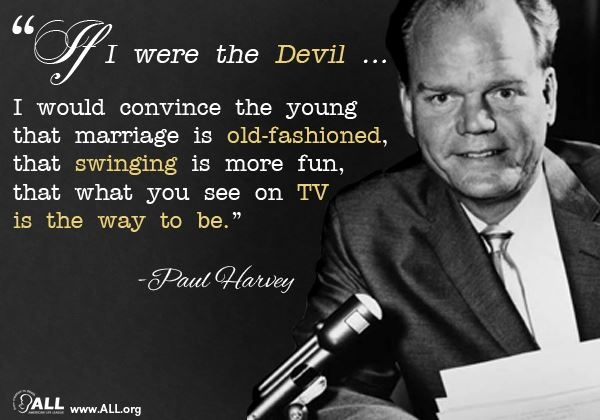If you haven’t heard Paul Harvey’s “If I Were the Devil” speech, you might want to give it a listen. This radio broadcast from 1965 sounds eerily prophetic when you look at the events that have unfolded in the United States since 2016. From the mainstreaming of transgender culture to the normalization of gambling and lotteries, it feels like Harvey had a crystal ball. Let’s dive into why this speech seems to apply so much to modern America.
The Rise of Transgender Culture
Paul Harvey’s speech touched on moral decay and societal changes that many at the time would have found unimaginable. Fast forward to today, and we see a significant cultural shift regarding gender identity. Transgender issues have moved from the fringes to the mainstream. Schools teach children about gender fluidity, and there are heated debates about bathroom access and sports participation.
For example, in 2016, North Carolina’s “bathroom bill” sparked nationwide controversy by requiring individuals to use bathrooms corresponding to the sex on their birth certificates. This law ignited protests, boycotts, and a broader conversation about transgender rights. Today, the conversation has only intensified, with media, businesses, and educational institutions increasingly advocating for transgender acceptance and rights.
Gambling and Lottery as Everyday Entertainment
In his speech, Harvey warned about the normalization of vices. Gambling and lotteries have indeed become woven into the fabric of American life. States promote lotteries as a means to fund education, while casinos and sports betting have seen a massive boom.
Take the Supreme Court’s 2018 decision to legalize sports betting nationwide. Since then, numerous states have jumped on the bandwagon, legalizing sports betting and expanding casino operations. Online gambling has also surged, making it easier than ever for people to place bets from the comfort of their homes.
The Breakdown of the Family Unit
Harvey emphasized the importance of the family unit and predicted its decline. Today, the traditional family structure is less common. The rise in single-parent households, blended families, and cohabitation without marriage reflects changing societal norms.
In 2016, the Pew Research Center reported that nearly half of all children in the U.S. live with a single parent or in a blended family. This shift has significant implications for how children are raised and the values they learn.
Decline in Religious Influence
Harvey, a devout Christian, warned of the diminishing influence of religion in public life. This trend is evident in modern America, where secularism is on the rise. According to a 2019 Pew Research survey, the number of Americans identifying as religiously unaffiliated has grown significantly, reflecting a move away from organized religion.
Public schools and government institutions increasingly adopt secular policies, and religious expressions are often challenged in courts. This shift aligns with Harvey’s prediction of a society moving away from its moral and religious foundations.
The Media’s Role in Shaping Morality
Harvey’s speech also criticized the media for its role in moral decline. Since 2016, media influence has only grown with the rise of social media platforms, streaming services, and 24-hour news cycles. These platforms often promote content that challenges traditional values and norms.
Consider the controversy over TV shows and movies that push boundaries in terms of violence, sexuality, and language. While these changes reflect broader societal shifts, they also play a role in shaping public perceptions and behaviors, often aligning with Harvey’s warnings about the media’s impact.
Political Polarization and Social Division
Harvey predicted increased division and strife, which is glaringly apparent in today’s political landscape. Since the 2016 presidential election, the U.S. has seen unprecedented political polarization. Social media has amplified this divide, with echo chambers and misinformation fueling tensions.
The 2020 election and the events surrounding it, including the Capitol riots, exemplify the deep-seated divisions within American society. This polarization affects not just politics but social interactions and relationships, echoing Harvey’s concerns about a fractured society.
Paul Harvey’s “If I Were the Devil” speech, though delivered in 1965, seems to resonate deeply with the events and trends in the United States from 2016 onward. The rise of transgender culture, the normalization of gambling, the breakdown of the family unit, the decline of religious influence, the media’s role in shaping morality, and increasing political polarization all reflect the prophetic nature of Harvey’s words.
As we navigate these changes, it’s worth reflecting on the insights from Harvey’s speech. Whether you view these trends as progress or decline, there’s no denying the striking parallels between Harvey’s warnings and today’s realities. It’s a call to consider how we want to shape our society moving forward and what values we choose to uphold.

